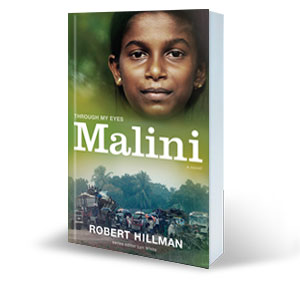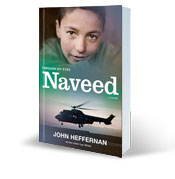Book review: Through My Eyes: Malini
Book review: Malini by Robert Hillman.
Published by Allen & Unwin – Through My Eyes series.
Set in Sri Lanka during the recent civil war, this novel is a powerful portrayal of how a war can seriously impact the daily lives of so many innocent people, and especially children. The action begins from page one when Malini and her younger sister Banni are thrust into the conflict one morning at dawn. The Tamil soldiers come to their village in northern Sri Lanka and force everyone out of their homes at gun point.
Terrified, and not knowing what it is all about, their family is on a forced march towards the coast where they will be used as human shields against the army. Their quick thinking father helps them to escape into the nearby forest, after thrusting a mobile phone into Malini’s hand. The two sisters successfully escape detection, but that is just the beginning of their troubles. Malini is unwillingly forced into the role of a parent, and when they “adopt” another group of vagrant children, all orphans, her troubles just multiply. Not only does she need to care for her growing “family”, she has to avoid the numerous patrols, find shelter for them to sleep, and feed them. The task is almost too much.
This story quickly becomes not only a story of survival against terrifying odds, it is a journey across the country in quest of her grandfather’s village where she hopes they will find refuge. Skilfully written, tense and with a great awareness of the culture, geography and people of Sri Lanka, the author has written a masterful novel, both fast moving and adventurous.
This is the sixth title I have read in the series Through My Eyes, a series dealing with the experiences of children in conflict zones. The dedicated website for the series includes teachers’ notes, author interviews and more. See the links below. I have also included links to other reviews I have written of books in this series.
Highly recommended.
Links:
- Through My Eyes series – teacher notes and more on the publishers website
- Review: Through My Eyes: Naveed – set in Afghanistan
- Review: Through My Eyes: Shahana – set in Pakistan
- A troubled people: plus a review of Zafir – set in Syria

A new form of reading
I have finally joined the ranks of those with an eReader.
Yes, I know I am slow at adapting to the latest technologies, but I have some sound reasons. The main reason was a reluctance to buy any more books. I have many piles of unread books and magazines cluttering various parts of the house. I have been trying hard to get on top of these heaps of reading materials, but the list seems never ending. One day I will overcome this problem – I guess – though it has the benefit of never having to look far for something to read. (You are probably thinking that my house is a very untidy mess of books and magazines. Wrong. It is a quite tidy mess of books and magazines.)
But back to the eReader.
It was a freebie from my bank’s awards’ programme, a Kobo Aura. It was very easy to set up, and even easier to buy books. (Too easy, as my wife has discovered.)
My first book was The girl with the dragon tattoo, one I had been planning to read for some time. The reader is very easy to use and especially easy to read in bed. I recently read Peter Fitzsimons’ huge 800+ page tome called Gallipoli. I managed to read it partly in bed, but it was not really ever comfortable.
I won’t do a review of my first book just yet. I did find it a riveting tale and read it in only a few days. All I will say for now is that despite the compelling draw of the story I did not particularly enjoy the book. Sadism is not my thing, and several characters in the book are brutally sadistic in nature.
From that interesting read I have moved on to a second ebook, The Kite Runner. So far I am enjoying it.
Good reading.
Good writing.
Review: Through my eyes: Naveed

“Naveed” by John Heffernan is the second in the “Through my eyes” series of novels set in war zones, told from the perspective of children caught in such conflicts. “Naveed” is set in Afghanistan, a war we have heard so much about, but in reality know so little of the suffering of innocent people caught in the crossfire.
Naveed, the main character, is totally tired of the war tearing his country – and family – apart. His father is dead, yet another victim of the war. Yet it is Naveed, his sister Anoosheh and his mother who are the real victims. His sister lost her legs when a land mine exploded and his mother cares for them as best she can in a small rented room. There is the constant battle for enough money for food and for their greedy landlord.
Naveed works the markets, taking whatever jobs are on offer, in an effort to care for his mother and sister. Too often he is the target of street gangs until he adopts a street dog Nasera. The dog quickly becomes not only a protector from the gangs, but also one displaying extraordinary abilities. Befriended by an Australian soldier, Naveed and Nasera team up to make a difference to the people living around them.
“Naveed” is a fast moving, exciting story giving a close up view of life in modern Afghanistan in the midst of a terrible conflict. The main characters, Naveed and his family, are strongly drawn characters one immediately cares for, and as the plot develops a sense of foreboding looms – with a totally believable outcome. The ending brings a sense of hope for the future of this ravaged country and its people.
Highly recommended.
“Naveed” is published by Allen & Unwin.
Teachers’ notes and an interview with the author can be found here.

